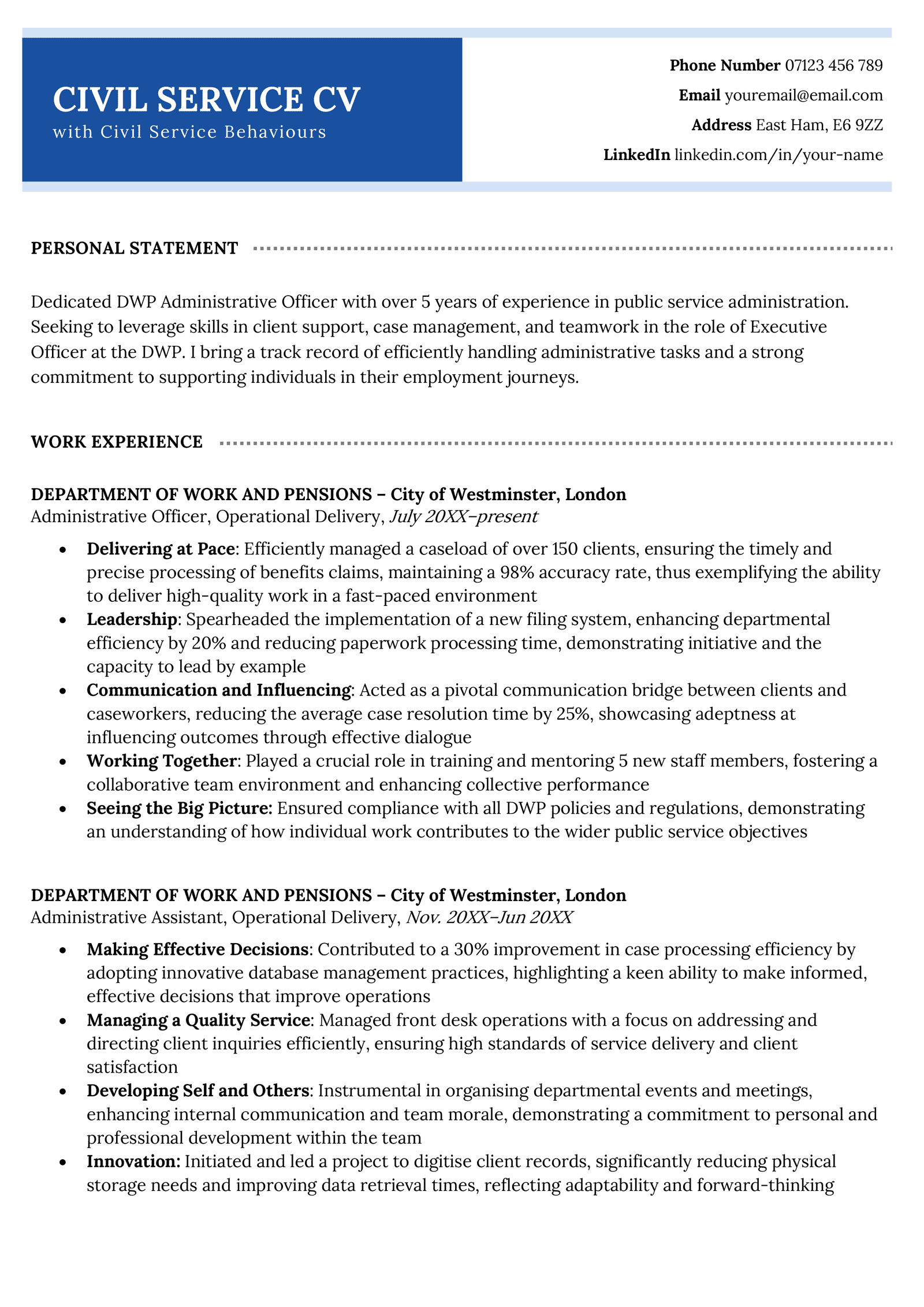Recruiting managers in the Civil Service seek evidence of behaviours in candidates for jobs in various UK government departments. Once you’ve found a Civil Service job you’re interested in, you’ll first need to prepare your application in the normal way. In other words, you’ll need to:
- write a Civil Service Behaviours CV (or make one using an online CV builder)
- write a cover letter (or again, make one using an online cover letter creator)
- prepare a resignation letter if you’re currently working (don’t send it in until you know you got the new job!)
- gather documents proving you have the right to work in the UK
- prepare for Civil Service Behaviour interview questions
We’re here to help you get the role you want at His Majesty’s Government.
What are Civil Service Success Profiles?
The Civil Service’s Success Profiles are the new method the organisation uses to evaluate candidates for Civil Service Jobs.
Success Profiles replace the former competency-based evaluation method that based candidate evaluation on your ability to perform certain tasks.
The five Civil Service Success Profiles (and what they mean) are:
- Behaviours — how you behave in a job that helps you succeed
- Strengths — your talents and mindset
- Ability — your ability to do the job advertised
- Experience — your experience in similar roles
- Technical — your technical skills and certifications
The Strengths, Abilities, Experience, and Technical facets are straightforward, and the Civil Service will look at your government job CV and cover letter to check whether you have the right work experience, hard skills and soft skills, and accomplishments for these four facets.
The Behaviours facet is a bit trickier though because His Majesty’s Government is looking for evidence of how you react in certain stressful or urgent situations, so they’ll test your Behaviours through interview questions.
Because it’s important to be able to answer the questions in your Civil Service interview(s), you should learn about the Civil Service Behaviours framework.
What is the Civil Service Behaviours framework?
The civil service behaviour framework is the list of behaviours that the Civil Service looks for in its candidates.
Here’s an introduction to the names of the nine Civil Service Behaviours and what they mean:
- Seeing the Big Picture: Understanding HM Government’s policies and objectives as well as your own role in fulfilling them.
- Changing and Improving: Seeing ways of improving the work process, both team-wide and on an individual basis.
- Making Effective Decisions: Evaluating potential decisions and making well-researched decisions that deliver taxpayer value for money.
- Leadership: Leading a team and championing diversity and inclusion in the workplace.
- Communication & Influencing: Showcasing your effective communication skills and providing people with alternative perspectives.
- Working Together: Being able to work well with people inside and outside of the Civil Service and provide resources to people who need them.
- Developing Self & Others: The ability to critically self-evaluate your strengths and weaknesses and respond appropriately to feedback from other people.
- Managing a Quality Service: Providing quality deliverables, and serving a diverse range of taxpayers in your role.
- Delivering at Pace: Completing your work at the required rate.
Civil Service behaviours on a CV — example
You’ll need to highlight civil service behaviours on your CV. Here’s a CV example that shows you how you can add these behaviours to your CV for a government job:

Civil Service Behaviours in the interview — examples & guidance
When interviewers try to find out whether you exhibit Civil Service Behaviours, they’ll use ‘Tell me about a time when…’- or ‘Describe a time when you…’-type questions, which give you the opportunity to launch into long, detailed answers where you show employers you have the Civil Service Behaviours.
Because there are nine Civil Service Behaviours, you should come up with an example of a time when you showed evidence of that Behaviour in previous roles (for example, an example of a time you made effective decisions).
One of the best interview tips is to use the STAR Method for framing your answers to Civil Service Behaviour questions. STAR stands for Situation, Task, Action, and Result.
For example, if you successfully dealt with a difficult person, you might break down the situation using the STAR Method like this:
Civil Service Behaviours: Examples of effective answers
Here are more example answers to Civil Service Behaviours questions:
Seeing the big picture
This behaviour is about understanding how the work of your department — and your own work — fits into the government’s programme and works in the national interest.
Changing and improving
For this behaviour, you’ll need to showcase your ability to discover problems, find improvements for them, and improve the workflow in your department. Here are some examples of common questions and answers for this behaviour.
Effective decision making
The Civil Service is looking for employees who can make good decisions when presented with various options to choose from — and be able to justify why they made them.
Leadership
Although leadership skills are more important for supervisors and department heads, leadership is a behaviour that the Civil Service might ask you about. Here’s how you could answer some common questions:
Communicating and influencing
As a member of the Civil Service, you’ll be expected to ably communicate with your colleagues, supervisors, and members of the public, so learn how to effectively answer questions about this behaviour.
Working together
When you join the Civil Service, you’ll need to work together with other colleagues and departments as well as customers, so you’ll need to show that interpersonal skills are a strength of yours.
Developing self and others
Interviewers will be looking for you to prove that you can accept feedback, spot your own weaknesses, and improve your performance. They’ll also want to hear evidence that you can provide support to your colleagues as they level up their own skills.
Managing a quality workplace
This behaviour measures your ability to create high-quality work and deliver results for the Government and the public, so practise answering the following questions.
Delivering at pace
To work for the Civil Service, you’ll need to prove you can meet deadlines, so you might get one of these questions. Use a similar answer to impress your interviewer:




